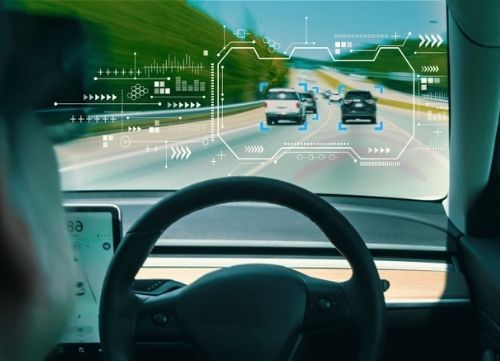
In our recent blog on the electric technology changing UK roads, we mentioned app-powered electric hire scooters as one example of the Internet of Things (IoT) impacting UK roads, and therefore fleet businesses.
That got us thinking about the role of IoT in fleet management, and specifically how IoT can help your fleet adapt for the future.
But before we investigate that, it’s important to first establish…
The Internet of Things (IoT) is the term used for web-enabled devices connected to a network that use software to exchange data with other devices and systems. In layman’s terms, if you have an internet-connected ‘smart’ device capable of tracking behaviour and sending that information elsewhere, or responding to inputs remotely (often via apps), it is a part of the Internet of Things.
Smart cookers, smartwatches and smart speakers are three examples of IoT devices that have become a part of everyday life. Another is telematics boxes, which have become a common way for insurance companies to monitor driver (including fleet driver) behaviour, and for drivers to potentially lower their premiums. Telematics, of course, also plays a huge role in modern fleet management.

Statista estimates that up to 85% of all new vehicles registered in the UK as of 2022 are web-connected, and that number will have grown to 100% by 2026. For fleets, that means any new fleet vehicles (purchased or leased) are likely to come with the connectivity that can help them take advantage of modern telematics systems. For fleets with older vehicles, meanwhile, it means fitting such solutions to those vehicles to take advantage of those features, without being left behind.
Telematics carries many benefits for fleets, including:
The first big advantage of using IoT to support your fleet lies in on-board GPS systems, which enable fleet managers to track vehicle location in real-time and extract journey information. They can potentially use this information, alongside other inputs like map data and traffic and weather forecasts, to optimise journey times and respond on the fly with altered routes if needed.
Another important example of how IoT can help your fleet is that telematics systems also give fleet owners access to vast swathes of vehicle data. Engine diagnostics, engine hours, fuel spend and speed are just four areas you can measure and study in the name of carving out increased efficiencies and boosting your bottom line with more efficient fleet operations.
The UK government has committed to net-zero carbon emissions by 2050. In order to make that target, businesses of all kinds have a soft mandate to halve their emissions by 2030, and a firmer one to reduce them by 78% come 2035.
According to government stats from 2019, HGVs make up only 5% of vehicles on UK roads, but account for 16% of vehicle emissions. By contrast, cars make up 79% but account for 55% of emitted pollution. This shows fleets have a considerable amount of work to do to reduce their carbon footprint in line with government guidelines, particularly in time for the 2030 milestone.
Because IoT-powered telematics systems allow fleet managers to delve into their fuel usage, they can see precisely where unnecessary emissions are occurring. This empowers them to act in the name of making their businesses greener.
The role of IoT in fleet management isn’t just to help fleets save on needless expenses. It can also dramatically increase their level of customer service. With cloud-based GPS services, customers can get real-time insight into where their delivery is, making for a more transparent and less frustrating customer experience.
Another significant upside of using IoT to support your fleet is the positive impact it can have on the behaviour of your fleet drivers. For starters, telematics software collects data like intense acceleration and harsh braking – both of which increase the risk of accidents. If you find one or more of your drivers is developing these bad habits, you can then use this information to offer training courses that bring them back to what best behaviour looks like behind the wheel.
If an accident does happen, meanwhile, the real-time tracking inherent to telematics systems allows you to respond and call for help straight away, increasing the chances of your drivers getting medical attention and walking away healthily.

In the future, the role of IoT in fleet management isn’t going to be limited to telematics. They may be several years from full automation, but self-driving cars (and by association, other fleet vehicles too) will be a true game-changer for fleets of all sizes.
In the meantime, self-driving features like Automated Lane Keeping Systems (ALKS) have already started helping motorists navigate longer journeys when coasting below 37mph. To learn about that and what to expect further down the line, see our blog post 'Self-Driving Cars: Is the World Ready?'
We also couldn’t wrap up this piece without mentioning 5G technology. Being up to 100 times faster than 4G, 5G will be the foundation for all future IoT technologies – in the motoring sector, and more besides. For fleet owners, outfitting vehicles with 5G tech, or purchasing/leasing ones that come with 5G already built in, will soon become a no-brainer – and will open up the possibilities for even more sophisticated telematics systems. Find out more in our blog post 'Next-Generation Fleet Technology Features.'
Wherever your fleet happens to be in its adoption of IoT and new technologies, at SG Fleet, we can help you create a roadmap that can take you into the future – with sensible milestones and common-sense costings that can set you up to stay competitive, and comply with green government targets.
To find out more, call us on 0344 854 5100 or email CSalmon@sgfleet.com.